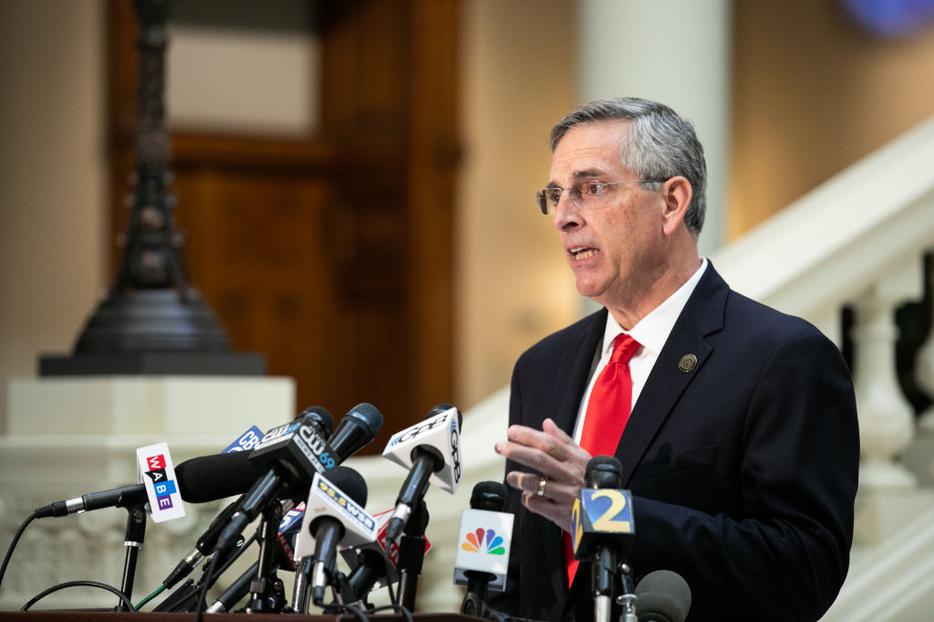Georgia on Their Minds: Pro-Lifers Gird for 2 Crucial US Senate Races
The outcome in January’s Peach State runoff elections will determine which party controls the Senate.

ATLANTA — The Jan. 5 special elections for two Georgia Senate races have become a central focus for both major parties, as they will determine control of the Senate — a matter that holds special importance for pro-life advocates.
“The outcomes of these races will determine the fate of the U.S. Senate and our nation,” Mallory Quigley, national spokeswoman for the pro-life Susan B. Anthony List, said in a statement.
“Without a pro-life Republican majority in the Senate, there would be no check on the pro-abortion Biden-Harris administration, Chuck Schumer, Nancy Pelosi and the radical pro-abortion lobby bent on ditching the filibuster and packing the [Supreme] Court.”
Currently, Republicans have successfully carried 50 seats in the Senate. This means that the only path for Democrats to take majority control of the Senate is to win both Georgia seats and have presumptive Vice President-elect Kamala Harris cast tie-breaking votes (barring the success of President Trump’s lawsuits in battleground states over alleged ballot irregularities).
Republican Sen. Kelly Loeffler is facing a challenge from Democrat Raphael Warnock, who was aheadof her 32.89% to 25.94% in the race. The race, a winner-take-all special election between 20 candidates to fill the last two years of the term of retired U.S. Sen. Johnny Isakson, advanced to a two-candidate runoff, as no candidate secured more than 50% of the vote. Republican Rep. Doug Collins, who finished third with 20% of the vote, endorsed Loefflerimmediately after it was clear that he had finished third.
In the other Georgia race, Republican Sen. David Perdue was slightly ahead of Democratic challenger Jon Ossoff by a 49.8% to 47.8% margin. But because Perdue received less than 50% of the vote, Perdue and Ossoff will face off in another runoff election.
Matthew Green, a professor of politics and associate fellow at the Institute for Policy Research and Catholic Studies at The Catholic University of America, told the Register that in the runoff elections, “the Republican incumbents will emphasize the need for the Senate to remain in Republican hands as a check on the new president. The Democratic challengers will likely point to Democrats’ unhappiness with Trump and the GOP, as well as any faults they can find with the incumbents.”
Sen. Chuck Schumer, D-N.Y., spelled out the stakes in the Georgia races in a comment Nov. 7, saying at a victory party following presumptive President-elect Joe Biden’s projected victory, “Now we take Georgia; then we change the world.”
Concretely, Republican control of the Senate would prevent the Democrats from moving forward any legislative priorities that a Biden White House and the Democrat-controlled House of Representatives seek to advance, unless such legislation is framed in a way that can draw bipartisan support in the Senate.
A GOP-controlled Senate would also retain the authority to reject Biden’s cabinet appointments and judicial nominations.
From a pro-life perspective, GOP control of the Senate would prevent any attempt at packing the U.S. Supreme Court with additional justices, something that could change the court’s current 6-3 conservative tilt following Trump’s appointment of Justice Amy Coney Barrett. Abortion-rights activists, supported by many prominent Democrats, including Rep. Alexandra Ocasio-Cortez of New York, have demanded this because of their concern that the Supreme Court might now be poised to strike down its 1973 Roe v. Wade decision that legalized abortion nationally.
For his part, Biden has been unwilling to say whether or not he would attempt to pack the court following Barrett’s appointment.
A GOP Senate could also thwart a Biden administration from granting statehood to Washington, D.C., and Puerto Rico, something Biden stated support for on the campaign trail and which would most likely mean four additional Democratic Senate seats.
In addition to potentially blocking court packing and statehood attempts that could permanently alter the makeup of the Supreme Court and Congress, a GOP majority in the Senate would block Biden’s legislative pro-abortion goals like abolishing the Hyde Amendment, which bars taxpayer-funded abortion, and codifying Roe v. Wade.
Kristan Hawkins, president of Students for Life of America, told the Register that these Senate races are crucial “because we know Democrats, pro-abortion extremists are very angry that Amy Coney Barrett was nominated and confirmed to the Supreme Court, they know that Roe v. Wade is at risk, and they’ve already started to threaten and produce conversations in D.C. about what it would look like to add on two more Supreme Court justices.”
“They will need a pro-abortion Senate to do that, and so that’s really what’s at stake,” she said.
She added that, for important pro-life legislation like keeping the Hyde Amendment in place, “you are going to need a firewall at the U.S. Senate.”
Both Sides Are Mobilizing
Pro-life and pro-abortion groups have both recognized how crucial these two races are, as they are mobilizing to spend millions on these races and engage on the ground with voters. Hawkins said that her group “had over 75 students in one night sign up” to knock on doors in Georgia, so “the pro-life generation is mobilized. They know what’s at risk, and they know what’s at stake.”
The pro-life Susan B. Anthony List will spend $4 million to reach 1 million Georgia voters in an effort that will include ads, voter calls and texts, and door-to-door canvassing.
“We are going all in for pro-life champions Kelly Loeffler and David Perdue,” Quigley said.
Ilyse Hogue, president of the pro-abortion advocacy group NARAL, told supporters in a video town hall Nov. 10 that in Georgia her group will “give Joe Biden and Kamala Harris the Senate that they need to, yes, advance reproductive freedom and abortion rights legislatively.”
Georgia was one of eight key states that NARAL Pro-Choice America invested $34.7 million in for mail, ads, canvassing and events. The group is still working to flip the Senate in Georgia and will be running a virtual phone bank for the two Senate races.
Planned Parenthood Southeast Advocates has also been campaigning for Warnock and Ossoff to flip Georgia blue. The nation’s largest abortion provider tweeted Nov. 8, “Let’s make sure we elect two repro rights champions to gain a pro-reproductive health care majority Senate.”
Failed 2018 Democratic Georgia gubernatorial candidate Stacey Abrams has been a major force in the state this election, and her pro-abortion group, Fair Fight Action, has already raised more than $3.6 million to help elect Warnock and Ossoff.
“This is going to be the determining factor of whether we have access to health care and access to justice in the United States,” Abrams said Nov. 8.
One abortion advocate, Tamara Stevens with the Handmaids Coalition of Georgia group, posted on social media encouraging Democrats to briefly move to the state, saying, “Hey all you Northern Democrats! You are all invited to spend the Winter in Georgia!!! Come on down and we will cook for you too,” coupled with info about the lack of length-of-residency requirements to vote in the state. Failed presidential candidate Andrew Yang and New York Times columnist Thomas Freidman also encouraged Democrats to move to the state.
However, a spokesman for the Georgia Secretary of State’s Office, which oversees voter registrations, cited state law to The Wall Street Journal that makes it a felony to take up temporary residence merely to vote in Georgia elections.
Intense National Attention
Both sides are expected to funnel tens of millions of dollars into the two runoff races, and leaders of both parties will likely campaign in the state in support of their candidates.
Green anticipated that a “big wildcard is what role Trump will play,” as “he won’t be running for anything, so he won’t have any coattails to offer the Republican candidates. On the other hand, he may decide to campaign for the Republican incumbents, and he seems to be very good at mobilizing the party’s base, so that could make a difference.”
Advisers to President Trump told Politico that they expect he will campaign for Loeffler and Perdue. Potential 2024 GOP contenders are also marking their support for the Republicans in these runoff elections, with some heading to Georgia and offering their assistance.
On the Democratic side, former President Barack Obama is reportedly in higher demand to campaign for Warnock and Ossoff than presumptive President-elect Biden.
“Turnout is going to be really, really important in these races,” Green said. “Voter turnout in special elections is usually very low, so even a marginal improvement in turnout for one side or the other could make a difference. That will also encourage the candidates to play to their party base, since it’s often only the most die-hard partisans who bother to vote in special elections.”
Chapman Rackaway, a political science professor at the University of West Georgia, told the Register that control of the Senate is the “fundamental” issue in these elections, since, if successful “Democrats would control both of the primary law-making branches of the federal government,” and “Republicans don’t want to be completely shut out of the process.”
He noted that the GOP has a slightly “easier job,” as “they need to only hold one of the seats; but as long as they keep one or both of them, they maintain their majority control of the chamber, and then they can do what the Senate does best, which is serve as a roadblock to the Biden-Harris agenda.”
Georgia’s Pro-Life History
Joshua Edmonds, the executive director of Georgia Life Alliance, told the Register that despite all the money and attention abortion activists are dedicating to the race, he is optimistic that Georgia voters will vote pro-life. “While there is much on the line with both of these races,” he said, “the pro-life issue is at the top of the list for Georgia voters, and they showed that on Election Day statewide.”
“After passing the most pro-life legislation in the country last year, the Heartbeat Bill, many suggested that we would lose our pro-life majority in the state House and suffer serious losses in the state Senate,” Edmonds said. “But not only did we reelect a pro-life majority in both chambers, including the author of the Heartbeat Bill, Georgia voters unelected the Democrat House Minority Leader and replaced him with a pro-life Republican.”
He added that, “but for a Libertarian on the ballot, Perdue would have won his race without a runoff. And in Sen. Loeffler’s race, which was a jungle special election with 20 candidates, the combined vote total of conservative pro-life candidates was 53%.”
“As the largest pro-life group in the state, we are already hearing from our supporters that they are committed to coming together and ensuring that the historic pro-life leadership of Sens. Perdue and Loeffler are protected in the runoff election,” he added. “The numbers are in our favor, and the data statewide tells a different story from what pro-abortion national media headlines are telling. Georgia is a state that values life.”
















